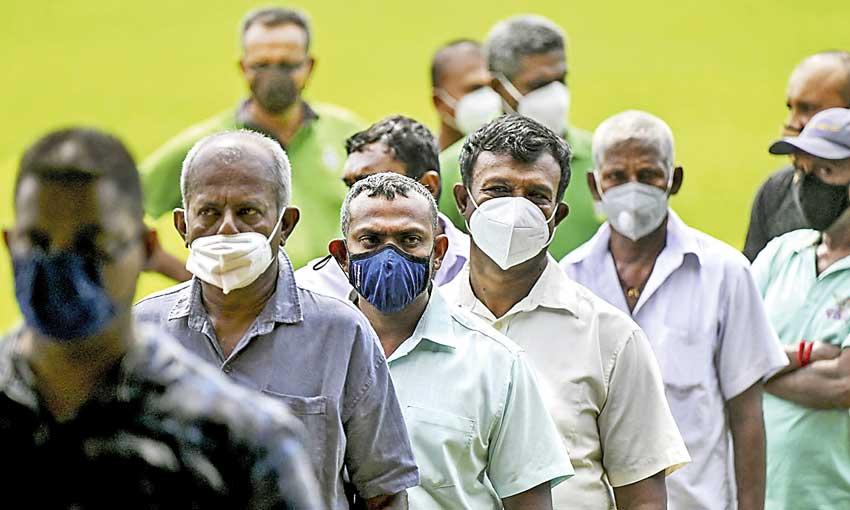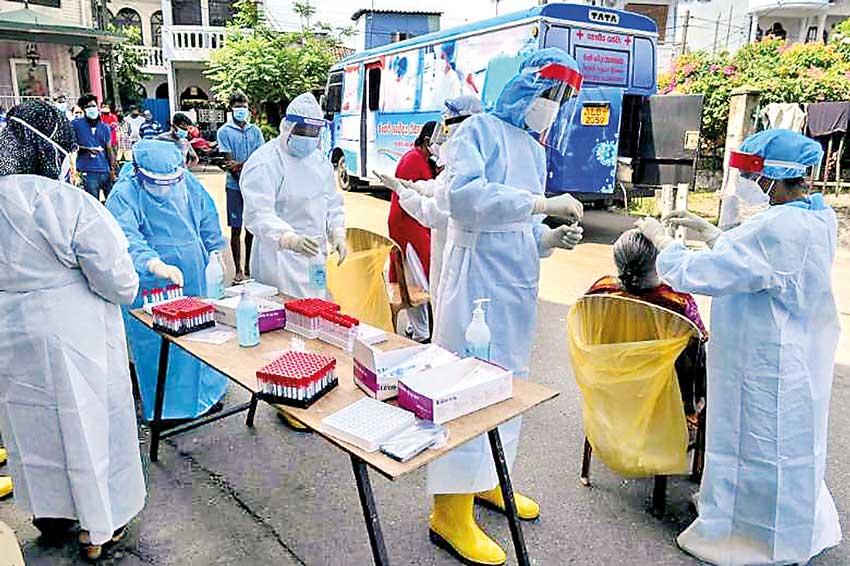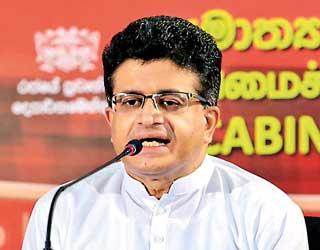13 May 2021 - {{hitsCtrl.values.hits}}

Minister Fernandopulle said the predictions would be the case if no healthcare interventions are made. She assured such interventions are already in place, but also sought public cooperation to tackle the numbers
Minister Gammanpila appears to be confident that a mix-and-match approach to the vaccine would avoid any issues with securing the AstraZeneca vaccine.
 A recent report published by a health research centre based in the United States has caused much worry for the public this past week.
A recent report published by a health research centre based in the United States has caused much worry for the public this past week.
With Covid-19 positive cases and deaths surging to record-highs since the outbreak in March 2020, the projections made by the research centre predicted a daily death count over 200 by June and a total death toll of 20,000 by September 1.
The prediction was published by the Institute for Health Metrics and Evaluation (IHME) of the University of Washington, an independent health research organization that provides a comparable measurement of the world’s health statistics. The organisation and its reports are closely observed by Western public health officials.
Its alarming predictions are not just reserved for Sri Lanka. The reported Covid-19 mortality figures are strongly related to the country’s testing capacity, IHME said.
The COVID-19 pandemic has caused nearly 6.9 million deaths across the world, more than double the number officially recorded, it said. Covid-19 deaths are most likely to go underreported, due to various testing capacities of each country, the report showed. It added that countries only record Covid-deaths that occur in hospitals or patients with a confirmed infection.

Routine PCR tests being carried out in suburbs of Colombo
Interventions in place to avoid grim predictions
State Minister Sudarshani Fernandopulle said that predictions made by the US health research facility would be the case only if no interventions are made.
|
State Minister Sudarshani Fernandopulle |
The Minister made this comment in response to a question from a journalist about the alarming predictions made by the research facility, during a state media briefing on the current state of the pandemic in Sri Lanka.
“It is certainly a prediction. The report states that daily deaths due to Covid-19 could be as high as 200 and daily positive cases could reach 10,000 to 20,000 per day. This could be the case if no interventions are made,” the Minister said.
The State Minister assured that necessary healthcare interventions to avoid such a grim situation as already been made.
“As a government, we have made the necessary interventions. The restriction of movements between districts and provinces is such an intervention we made,” she said.
“In addition to this, when we are alerted of a high number of positives in each Grama Niladhari (GN) division, we have proceeded to lockdown those areas. The infections, therefore, have been contained to each particular GN division,” the Minister explained.
 “As a mid-term strategy, we have fast-tracked vaccination rollout. PCR tests are being conducted regularly to identify positives who are being sent to hospitals, while their close contacts are being quarantined. These are the interventions that are already in place, through which we would be able to disrupt the spread,” she added. But it is impossible to tackle it without the corporation of the public. In order to stop the spread of the disease, the public must put an immediate stop to gatherings of family and friends and venturing outdoors unnecessarily.”
“As a mid-term strategy, we have fast-tracked vaccination rollout. PCR tests are being conducted regularly to identify positives who are being sent to hospitals, while their close contacts are being quarantined. These are the interventions that are already in place, through which we would be able to disrupt the spread,” she added. But it is impossible to tackle it without the corporation of the public. In order to stop the spread of the disease, the public must put an immediate stop to gatherings of family and friends and venturing outdoors unnecessarily.”
State Minister Fernandopulle also said that the transport of Covid-positive patients to healthcare facilities is facing a gridlock at present due to the high volume of positives being reported.
“If you suspect to have contracted the disease, please remain isolated within the house until your results are confirmed or until the healthcare workers can hospitalise you. This delay is mostly due to the priority given to elderly patients and patients with complications,” the Minister explained.
Meanwhile, the government has sought an explanation from the IHME for its projections, according to Joint Cabinet Spokesman Minister Udaya Gammanpila.
“The Government Medical Officers Association has sought an explanation from this university about the report. We have asked them to explain the basis on which the prediction was made,” the Minister said during the weekly Cabinet briefing.
Elderly still at risk, not young
State Minister Sudarshani Fernandopulle said that the elderly population were still at greater risk of death due to Covid-19 in Sri Lanka.
“There have been reports that the younger population are at greater risk of death at present in Sri Lanka. But at present, our numbers still indicate that there have been more elderly deaths reported thus far,” Minister Fernandopulle said.
She urged the public to strictly adhere to health guidelines to safeguard the elderly population.
In contrast to the Minister’s statement, however, in April, the Director-General of Health Services Dr Asela Gunawardana commented that medical authorities have observed a rise in complications among young people who contracted Covid-19.
“The number of admissions to hospitals and ICUs also remained at a lower rate in the previous virus strain. However, the number of ICU admissions has considerably gone up consequent to the new variant,” he said.
“Besides, there is also a tendency that the youths getting complications of symptoms and being admitted to ICUs, which shows the gravity of the situation,’ Gunawardena said.
Interestingly, Sri Lanka started administering the Russian made Sputnik V vaccine on May 6, to persons between the ages of 30 to 60 at the Gothatuwa MOH. The National Medicines Regulatory Authority (NMRA) approved the Russian jab for emergency use, soon after which the Cabinet of Ministers approved a proposal to purchase seven million doses of the vaccine.
Sri Lanka received 15,000 doses of the vaccine as a trial rollout, according to State Minister Fernandopulle.
The Russian vaccine is unlike the AstraZeneca vaccine, in terms of storage as well. Sputnik V must be stored in temperatures between 2 to 3 degrees Celcius. Equipping vaccination centres with storage facilities to match these requirements has been a challenge, Minister Fernandopulle admitted.
She said however that the trial rollout has been a success and the government would proceed to bring down more Russian vaccines with the hope of completing the vaccination of some 13 million Sri Lankans.
As the government still struggles to find some 600,000 doses of the AstraZeneca vaccine, required for the second dose of already vaccinated persons, Joint Cabinet Spokesperson Minister Udaya Gammanpila appears to be confident that a mix-and-match approach to the vaccination rollout would solve any potential inability to secure AstraZeneca vaccines. “Scientific experts have pointed out that there is no issue in vaccination with the first dose from one vaccine and the second dose with another,” the Minister said at the weekly Cabinet media briefing on Tuesday.
“Therefore there is no need to fear a vaccine shortage,” the Minister said while admitting that he was not knowledgeable in the field to make further comments.
However Minister Fernandopulle yesterday said that the WHO has not approved of a mix-and-match use of Covid-19 vaccines, adding that the second dose of any vaccine should be the same one administered earlier. “This may change in future, with ongoing research and trials,” she added.
However the government is in touch with countries such as Indonesia who have stockpiled vaccines to procure the necessary amount for Sri Lankans, he added.”
29 Dec 2024 9 minute ago
29 Dec 2024 3 hours ago
29 Dec 2024 3 hours ago
29 Dec 2024 5 hours ago
29 Dec 2024 6 hours ago